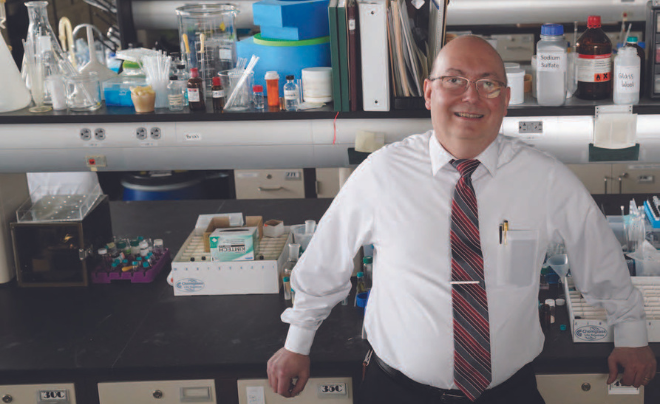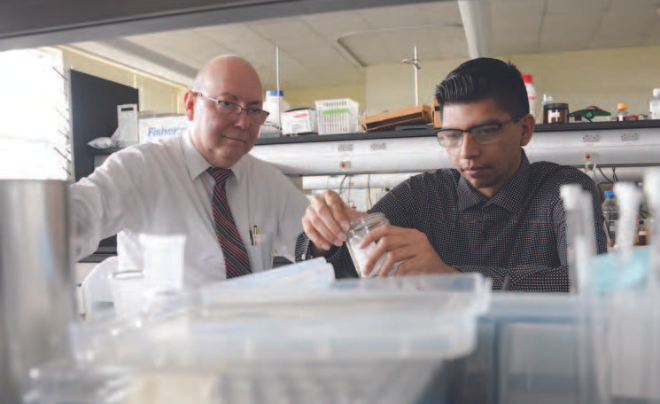UIW Research Project with Global Reach
By Stephanie Denning
Dr. Carvalho and team make strides towards malaria medication improvement
 "Malaria is, to many people today, what cholera was at the time the three founding Sisters came to San Antonio: a devastating disease," shared Dr. Paulo Carvalho, UIW associate professor of Pharmaceutical Sciences.
"Malaria is, to many people today, what cholera was at the time the three founding Sisters came to San Antonio: a devastating disease," shared Dr. Paulo Carvalho, UIW associate professor of Pharmaceutical Sciences.
Malaria, a parasitic mosquito-borne disease, is a major concern worldwide. It can kill a person within 24 hours of symptom onset. Globally, there were an estimated 241 million malaria cases in 2020 across 85 malaria endemic countries. And these numbers reflect an increase of over 15 million cases in a one-year period. In 2020, it caused an estimated 627,000 deaths.
Carvalho is researching ways to combat this disease, and he has been awarded two National Institutes of Health (NIH) Grants to use for this purpose. The first grant which is for $96,600 per year over four years, allowed Carvalho to hire a technician to help with researching ways to treat the infection.
"This grant proposes the use of a fungus to modify the antimalarial artemisinin and use this modified product as starting material for new artemisinin derivatives, testing it against the organism that causes malaria and to see if it can block the infection," stated Carvalho.
After bringing in Dr. Matthew Valdez as his technician, Carvalho received a second grant that supplemented the hiring of a post-doctoral fellow belonging to an underserved group. Carvalho promoted Valdez to post-doctoral fellow and hired Charles Moreno as a technician, growing his team to aid in the search for answers.
These two grants do not fund student stipends, however, so Carvalho also applied for funds from foundations that have now allowed him to hire students for summer research. These funds, allied to UIW intramural grants, have brought several qualified undergraduate, master's and pharmacy students to work in the lab.
foundations that have now allowed him to hire students for summer research. These funds, allied to UIW intramural grants, have brought several qualified undergraduate, master's and pharmacy students to work in the lab.
Adds Carvalho, "Last, but not least, many students have also worked on this project as volunteers, for the enriching experience research can provide."
Carvalho's philosophy of teaching is based on his being, as he defines himself, "a curious person." His relationship with students in the classroom and in the laboratory is geared towards sharing and awakening that same curiosity. Thus allowing students to continue learning by being curious as to how to better themselves and the lives they touch.
Some of the science is proving to be successful.
"We sent an initial set of compounds for testing to the University of California, Riverside, and the results were very good," stated Carvalho. "We are currently trying to patent these compounds and afterwards we can publish our results. Meanwhile, we are preparing more derivatives for probing the mechanism of action of artemisinin. The end goal of this research is to find a compound that may help end the suffering caused by malaria." According to Carvalho it is estimated that only one in each 5,000 compounds studied in labs across the world end up approved as medicines.
"This is a long shot," admitted Carvalho. "However, should one of these compounds be a lucky one, we would like to see it alleviate the suffering caused by malaria, especially in poor countries."
Much like the Sisters of Charity of the Incarnate Word, Carvalho continues to address one of the most pressing global issues of our time. He and his team continue to work diligently, through science, to find new therapies for those suffering from malaria around the world.
"Some organisms have already shown signs of resistance, so we hope to tweak this drug in a way that keeps resistance at bay for a little longer," said Carvalho resolutely. "If our research has the potential to advance health and quality of life for the people affected by this disease, it is our duty to pursue it and give it our best."

